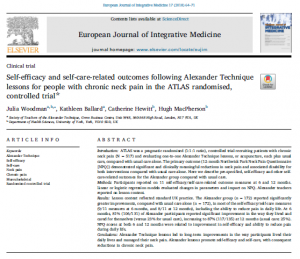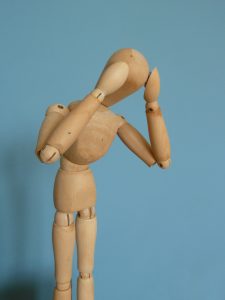
It’s the beginning of January and some of us may find ourselves struggling to put into practice our New Year’s resolutions. Resolutions usually involve a desire for change – to either achieve or to be something different to now. We start off with good intentions but then find that making change happen can be incredibly difficult, particularly if it’s to be long-lasting. If we fail, it’s very easy to believe that it’s due to a lack of ‘willpower’, or because of factors that are beyond our control. Well, of course we can’t do much about factors beyond our control but we can take a look at ourselves and ask the question of what does it really take in order to be able to change?
The Alexander Technique is a method for self-change. It provides us with the thinking tools to become more aware of ourselves and our habits, and gives us a practical, thoughtful and embodied approach to bringing about change. It works with the way we think, react, act, move and be – and, because we’re dealing with such fundamentals, it gives us a process for getting to the real root of a problem. Instead of fixating on the desired goal, we learn to give ourselves time and to pay attention to how we go about achieving the goal. This also means we are more likely to set realistic goals and so are more likely to achieve them. The approach is to prioritise looking after ourselves throughout the process of working towards our goal. It’s a more sustainable approach than the ‘all or nothing’ attitude that often leads us to give up at the first hurdle.
The Alexander Technique can be applied in every aspect of life, helping us to make the changes that we want to make – from learning how to exercise without injury to reducing postural and movement habits that might be the cause of back or neck pain. Some of the hardest habits to shift can be thinking habits, and learning the Alexander Technique helps us to change our thinking. The American philosopher and educationalist John Dewey found that it enabled him to change his intellectual position on an issue whenever new evidence emerged to challenge it – he contrasted this with other academic thinkers who continued to hold rigidly to one position come what may [1].
If you’d like to find out more about how the Alexander Technique can help you make changes, consider booking an introductory lesson. Be sure to choose a qualified, registered teacher – members of the Society of Teachers of the Alexander Technique (STAT) have undertaken 3 years’ full-time professional training. If you live around Edinburgh you might like to consider myself or one of my colleagues. Visit the STAT directory to find a teacher local to you.
- Frank Pierce Jones. Freedom to change. Mouritz, London, 3rd edition, 1997; p97.





